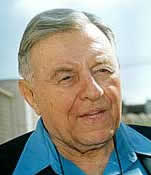Teddy Kollek
(1911 - 2007)

Much of the face of modern Jerusalem is due to the efforts of the former mayor, Theodor “Teddy” Kollek. He worked to develop the city, economically, culturally, and socially, and accord its proper reputation as the capital of modern Israel.
Kollek was born on May 27, 1911, near Budapest and grew up in Vienna. He was active in the He-Halutz pioneering movement in Europe and moved to Eretz Yisrael in 1934, where soon thereafter he helped found Kibbutz Ein Gev. From just before the outbreak of World War II, he served abroad in many capacities. Early in his career representing Jewish interests in Europe, he met Adolf Eichmann and arranged for the transfer of 3,000 Jewish youth to England. From 1940 to 1947, he worked with the Jewish Agency in Europe, maintaining close contact with the Jewish underground movement, and was involved with the “Beriha” rescue operation. From 1947 to 1948, as a representative of the Haganah in Washington, he assisted in amassing essential ammunition for the fledgling army of the state-to-be. He served as minister to Washington early in the 1950s but returned to Israel in 1952 to Prime Minister David Ben-Gurion’s office until 1964. He was the founder and director of the Israel Museum, the national museum complex that he felt would be so essential to Jerusalem’s political prestige as a capital city.
In 1965, Kollek was elected mayor of Jerusalem and served in that office for the next twenty-eight years. Presiding over the city when it was unified in 1967, Kollek was determined to develop Jerusalem not only as a geographically and municipally united city but as a socially unified one as well. Indeed, many of Kollek’s most intense efforts went towards bridging the gaps between the varied ethnic and religious populations. He recognized the Arab sector’s needs within the Jewish capital. Similarly, he respected the religious values of the ultra-Orthodox community, yet resisted any attempt at religious coercion in city affairs. His overtures toward minority groups, particularly the Arab residents of Jerusalem, at times alienated many of his constituents, yet Kollek’s openness and tolerance earned him the respect of many, both in and out of Jerusalem.
Under Kollek’s tenure, and especially after the unification of the city in 1967, Jerusalem grew in size and in variety. New neighborhoods, both within the city and in outlying suburbs, were launched, and parks, community centers, and educational and religious establishments were supported. Tree-lined routes and landscaping have changed the city as dramatically as the rapid urbanization and new highways cutting across the hills and valleys. In addition to the Israel Museum, Kollek built other cultural institutions, including the Jerusalem Theater. Kollek also oversaw the rebuilding of the Jewish Quarter in the Old City, the restoration of many historical landmarks, and the advancement of archeological research. Many of Kollek’s projects resulted from his persistent but successful fundraising and, in 1991, he established the Jerusalem Foundation, whose goal is to further the aesthetic and cultural development of the city.
In 1988, Kollek was awarded the Israel Prize for his special contribution to the country. Five years later, he decided to delay a planned retirement and run again for mayor but lost to then Likud-supported candidate Ehud Olmert.
Theodor “Teddy” Kollek passed away on January 2, 2007, at the age of 95. As a mayor for more than a generation, he will be remembered as the person who shepherded the transition of Jerusalem from a Mideast backwater with a glorious past to a world capital of culture and politics.


